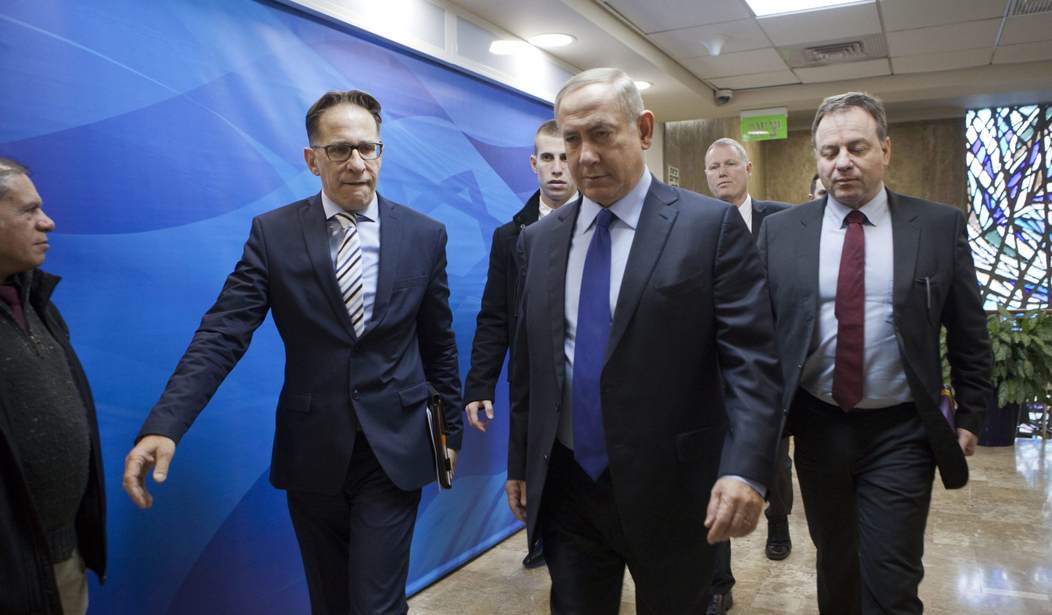Israeli Prime Minister Benjamin Netanyahu called it a “shame” that Secretary of State John Kerry misses the “simple truth” that the right of Israel to exist as a state and the persistent onslaught of Palestinian terrorism are the core issues in any peace process, not West Bank settlements.
Delivering remarks in Jerusalem after Kerry’s speech in Washington, Netanyahu said Kerry’s criticism of the Jewish state was “deeply disappointing to millions of Israelis.”
The prime minister prefaced his remarks by underscoring that Israel is “deeply grateful” to multiple U.S. administrations, Congress and the American people “for the support Israel has received over many, many decades.”
“I have no doubt that our alliance will endure the profound disagreement we’ve had with the Obama administration and will become even stronger in the future,” he said.
Netanyahu called Kerry’s remarks “a speech that was almost as unbalanced as the anti-Israel resolution passed at the UN last week.”
“In a speech ostensibly about peace between Israelis and Palestinians, Secretary Kerry paid lip service to the unremitting campaign of terrorism that has been waged by the Palestinians against the Jewish state for nearly a century. What he did was spend most of the speech blaming Israel for the lack of peace,” he said.
Suicide bombers and rockets fired at Israel “are not throwaway lines in a speech,” he added.
“They are the realities that the people of Israel have to endure because of mistaken policies, policies that at the time won the thunderous applause of the world,” Netanyahu continued. “I don’t seek applause. I seek the security and peace and prosperity, and the future of the Jewish state. The Jewish people have sought their place under the sun for 3,000 years and we’re not about to be swayed by mistaken policies that have caused great, great damage. Israelis do not need to be lectured about the importance of peace by foreign leaders. Israel’s hand has been extended in peace to its neighbors since day one, on its very first day.”
“…No one wants peace more than the people of Israel. Israel remains committed to resolving the outstanding differences between us and the Palestinians through direct negotiations. This is how we made peace with Egypt. This is how we made peace with Jordan.”
Netanyahu cited President Obama telling the United Nations in 2011 that peace would not come through statements or resolutions. “Until last week, this was repeated over and over again as American policy.”
Until, he said, this “radical shift in U.S. policy toward the Palestinians … despite the Palestinians walking away from peace and from peace offers time and time again” and “inculcating a culture of hatred toward Israel.”
Netanyahu called upon the Obama administration in its final days to “prevent any more damage being done to Israel at the UN.”
He said it’s hard to believe administration promises that it won’t bring any UN resolutions in the 11th hour as “we have it on absolutely incontestable evidence that the United States organized, advanced, and brought this resolution to the United Nations Security Council.”
“We will share that information with the incoming administration — some of it is sensitive,” he adding, adding that was released in the Egyptian media was “the tip of iceberg.”
“I think the United States, if it’s true to its word, or at least if it’s now true to its word, should now come out and say we will not allow any resolutions, any more resolutions, in the Security Council on Israel… stop this game, the charade.”
Netanyahu stressed that “decisions vital to Israel won’t be made in speeches in Washington.”
“How can you make peace with someone who rejects your very existence? … This conflict is, and has always been, about Israel’s right to exist,” he said. The world must focus on Palestinian terrorism, Netanyahu added, “if they truly want to advance peace.”
“It’s a shame that Secretary Kerry does not see this simple truth,” he said.
Kerry argued on MSNBC after his speech that his remarks were “very constructive, pro-Israel, pro-region, pro-Palestinian, pro-the communities’ ability to try to make peace.”
“Why are people fighting peace? What is suddenly in the air that people want to go down a road which is so obviously confrontational?” he said. “…What we were saying today is it is possible to make peace. It is possible to take steps on the ground that would have a profound impact on changing the dynamics. I think, you know, Prime Minister Netanyahu has the ability to be able to do some of that. My hope is that he will choose to do those things.”
“And I think that if Israel continues its policy of settlements, I think it’s going to get very, very difficult on an international scale, and perhaps even potentially in the region, because of the reality that is dawning on people about what is happening to the possibilities of peace.”









Join the conversation as a VIP Member